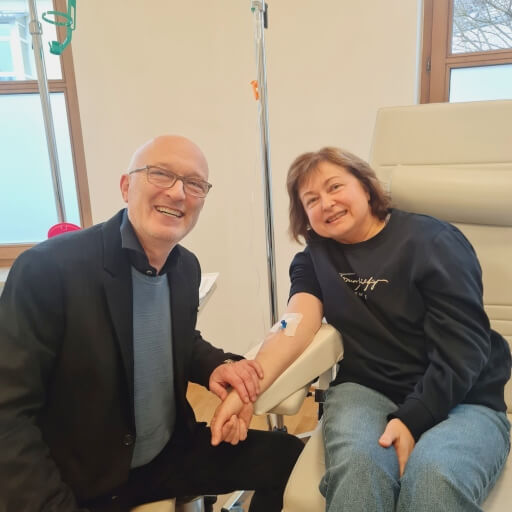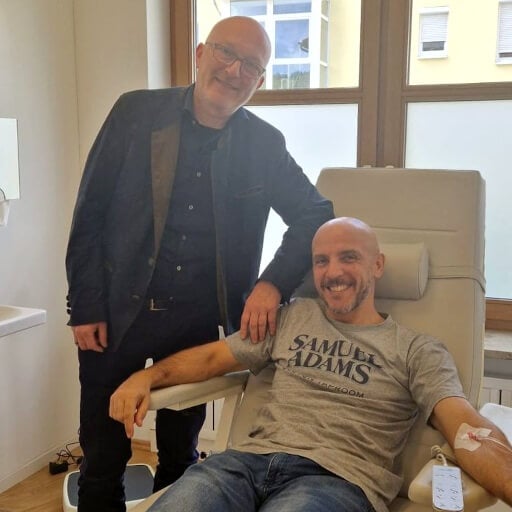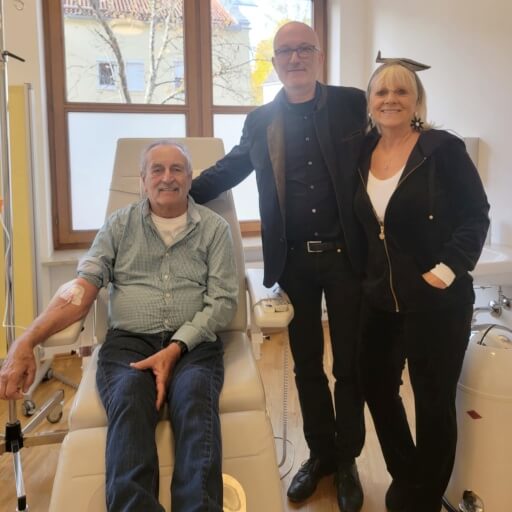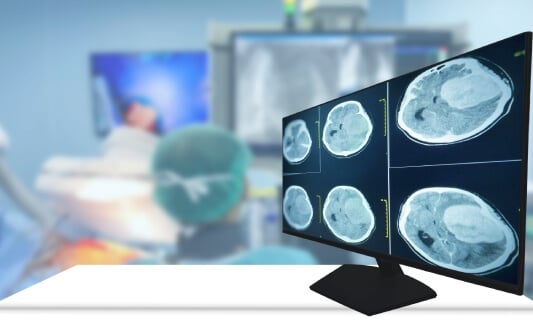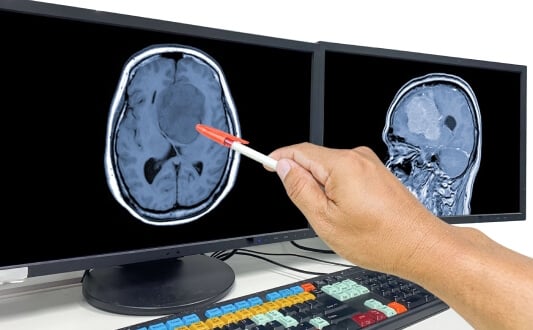Surgery remains to be the mainstay of treatment for most types of cancer. Neurosurgery in Germany can often be a curative measure in patients with brain neoplasms. However, brain tumors can also be treated with a number of non-surgical methods. They don’t only complement the operation, but can sometimes completely replace it. Let's discuss how to treat brain tumors with conservative methods.
Is a brain tumor treatable?
Non-surgical methods such as a therapeutic agent for tumors of intracranial localization often play a crucial role in the treatment process, since it is not always possible to treat a brain tumor by surgery. Often, the tumor is located in functionally active areas, which are hard to reach. Thus, its surgical removal becomes even life-threatening for the patient. The choice of treatment though largely depends on the type of brain tumor and its characteristics. Generally speaking, all tumors can be divided into two groups: malignant and benign. Benign brain tumors are non-cancerous, which means they do not invade other tissues, organs, or body regions. Malignant tumors, on the contrary, are invasive tumors characterized by invasiveness, poor cellular differentiation and tendency to metastasize. Such tumors typically grow uncontrollably and travel to distant sites – far from the primary tumor.
Is brain tumor treatment without surgery possible? Yes, it is, and there are many effective treatments that can significantly extend a patient's life span and improve quality of life. These therapeutic interventions include radio- and chemotherapy, targeted therapy,immunotherapy, electric field therapy, and symptomatic treatment. Each method itself has proven to be efficient in multiple studies. For example, chemo-and radiotherapy are included in multiple cancer treatment protocols for various types of malignant tumors. Immunotherapy can significantly influence disease prognosis – up to 20% of patients get long-lasting results. The number of pediatric patients undergoing proton therapy has increased by nearly 3 times since 2012 as well as the number of skull base tumors treated by proton therapy. Symptomatic treatment is required for all patients during the latest stages of brain tumor development. Whether or not a brain tumor can be cured, as well as a treatment modality used,depends on a number of factors. These include:
- The type of tumor and degree of tumor malignancy
- Stage of cancer
- Patient’s past medical history and history of previous treatment complications
- Individual health state
In recent years, new innovative methods of treatment have appeared in developed countries that allow extending a patient's life up to several years without the use of surgical methods.
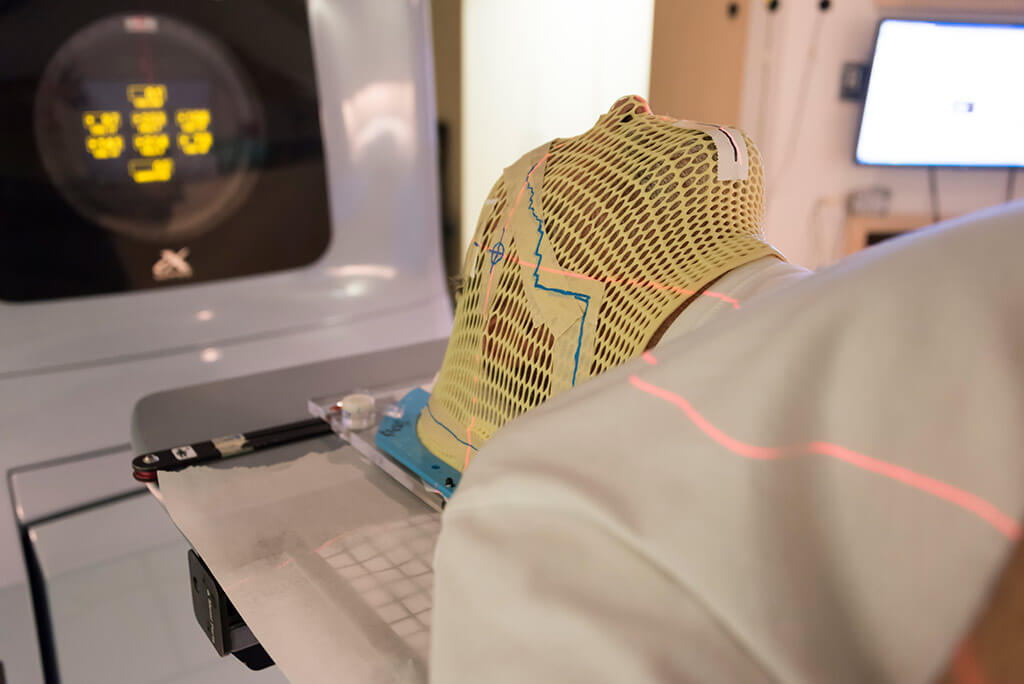
Radiation therapy for brain tumor treatment
Radiation therapy is one of the main types of alternative brain tumor treatment. The radiation therapy method implies patients being exposed to external irradiation. A brain tumor is treated with radiation therapy in the following cases:
- After surgery, to reduce or delay the risk of recurrence
- As a palliative treatment to reduce the size of the tumor and relieve the symptoms
- As an independent method of treatment, if the operation is not performed for some reasons
Radiation methods are distinguished by their accuracy, efficiency, and the degree of impact on the surrounding tissues. The following types of radiation therapy are currently used to treat brain tumors:
- Remote radiation therapy . This is the simplest radiation method that has long been used in oncology.
- Three-dimensional conformal radiation therapy . A more advanced method of radiation that minimizes the radiation dose to healthy tissue. MRI is used to accurately localize the tumor. Multiple rays of gamma rays are then sent to the tumor from different directions.
- Modulated intensity radiotherapy . A dose-controlled 3D radiation therapy method. With this technique, the doctor can increase the radiation dose to the tumor and decrease it for healthy tissues that are most sensitive.
- Stereotactic radiosurgery . Stereotactic radiosurgery makes it possible to cure a brain tumor in a hard-to-reach location in one or several sessions of high-precision and high-dose radiation. The Gamma Knife or Cyberknife settings are used.
- Proton therapy of brain tumor . Instead of X-rays, it uses positively charged particles. It is highly safe because healthy tissue is minimally damaged. In this case, the tumor receives a large dose of radiation.
Whether a brain tumor can be cured with radiation therapy alone depends on the degree of its malignancy and stage of the disease. With benign tumors, it is usually possible to achieve a sufficiently long life expectancy of the patientand the relapse-free period that may last 5-10 years or more. However, in the case of malignant tumors,it is almost impossible to stop the growth of a brain tumor without the risk of recurrence with radiation therapy alone.
Chemotherapy for brain tumor treatment
Chemotherapy proved to be slightly less efficient and prominent in the treatment of brain tumorsthan in the treatment of other types of cancer. The reason is that the brain is separated from other organs and systems by the blood-brain barrier and most chemotherapeutic drugs cannot overcome it. Therefore, after injection into a vein or when taken orally, the drugs simply do not reach the tumor tissue and, therefore, cannot affect it.
Chemotherapy is used to treat brain tumors in the following cases:
- If the tumor grows very quickly
- If no surgery has been done, chemotherapy can be used in combination with radiation therapy
- If surgery has been performed, chemotherapy drugs are injected through a catheter directly into the ventricle of the brain, thereby overcoming the blood-brain barrier
- If a patient is diagnosed with lymphoma or medulloblastoma, these types of neoplasms respond better to chemotherapy
New innovative methods of brain tumor treatment without surgery
Immunotherapy is considered to be one of the most potent brain tumor treatments without surgery. The main mechanism of action of this therapeutic method is based onits ability to stimulate the body's own immune response directed at malignant tumors, assisting to overcome tumor’s immune escape mechanisms. Dendritic cells are the primary managers of most immune responses and are therefore at the forefront of immunotherapy. It is for that reason, the discovery of these cells was acknowledged with a Nobel Prize in Medicine. Since there is scientific evidence confirming decrease in the number of dendritic cells and their functional capacity, it is obvious that malignant tumors disrupt a patient's immune response to escape elimination. And thus, the management of brain tumors with dendritic cells may have a valuable benefit to other treatment modalities enhancing brain tumor elimination. To find out more about this innovative treatment, watch Prof. Gansauge talking about how to get rid of brain tumors without surgery, by means of dendritic cell therapy.
Prof. Frank Gansauge: How Dendritic Cell Therapy is Transforming Modern Cancer Treatment
A number of factors determine an individual response to immunotherapy. These include patient characteristics (age, microbiome, genetics, previous infections, or exposure to immune-modulating drugs) and tumor features (microsatellite instability, specific immune signatures, and tumor microenvironment content and function). Numerous studies have shown its valuable benefit in the treatment of solid tumors.
Without a doubt, as with every therapeutic modality, there are a number of downfalls with immunotherapy as well. Immunotherapy cannot be used as a single treatment approach in brain tumors. It is yet a complementary treatment to surgery and/or chemotherapy. Patients with immune-resistant neoplasms as well as individuals with exhausted immune cell pools (specifically T-cell pools) cannot undergo this therapy. There are plenty of ongoing studies aimed at enhancing mechanisms to avoid tumor defensive mechanisms, which already show promising results for further wide usage of dendritic cell vaccines.
Inspiring stories of our patients with brain tumors
Vaccines containing dendritic cells are a safe non-surgical method of brain tumor treatment. One of our patients who underwent immunotherapy with dendritic cell vaccine for glioblastoma shares her impressions of the therapy. "The treatment process itself was surprisingly simple", says Daria Rogers , describing dendritic cell vaccines in the most precise way. Daria Rogers sought help from BookingHealth looking for alternative ways to deal with her brain tumor. After being administered a dendritic cell vaccine in Germany, only 3 months after her MRI scans demonstrated remarkable improvement attributed to this therapeutic intervention.
Another patient, Aaron Nahani, who was diagnosed with glioblastoma multiforme, also received a dendritic cell vaccine in Germany . Apart from comprehensive support from BookingHealth specialists, as a result of this intervention, his follow-up appointment revealed a considerable brain tumor shrinkage validating the treatment's effectiveness.
Every Patient Has a Story: Booking Health Treatment Journeys that Inspire
Comparison of different treatment options for brain tumors
The choice of specific treatment method depends on several factors, including tumor characteristics, disease stage, and cost of treatment. Each case of brain tumor should be thoroughly examined in order to suggest the best therapeutic strategy. All treatment options for brain tumors vary in terms of duration, expected outcome, and cost. A comparative table for the aforementioned treatment options is stated below.
| Treatment type | Treatment response | Duration | Estimated Cost € |
|---|---|---|---|
| Surgery | Effective for resectable tumors, reduces symptoms | 3-12 hours (procedure) + weeks-months for recovery | 9,600 - 50,200* |
| Radiotherapy (Proton Beam Therapy) | Effectiveness varies by tumor type | 5-7 weeks (daily sessions) | 46,900 - 86,500 |
| Chemotherapy and Radiotherapy | Moderate effectiveness, especially for high-grade gliomas | Several cycles over months | 21,100 - 58,400** |
| Dendritic cell vaccine | High effectiveness for various types of brain tumors | 1 week | 20,000 - 38,000 |
*Prices may vary depending on the size of the tumor and its location.
**Prices vary depending on the type of the tumor and chosen treatment program.
Symptomatic treatment of brain tumors
Despite significant scientific advancements, not every brain tumor is curable so far. Sometimes the goal of therapy is not the patient's recovery, but the elimination of the main symptoms in order to improve the patient's quality of life. Symptomatic medications always complement the basic treatment for a brain tumor.
These medicines include:
- Corticosteroids – relieve headaches, eliminate inflammation after radiation therapy, prevent cerebral edema.
- Anticonvulsants – reduce seizures in people with brain tumors.
- Hormonal treatment – used for hormone-producing tumors (for example, with pituitary neoplasms) to correct metabolic disorders.
Specialized hospitals for brain tumor treatment without surgery
Non-surgical treatment of brain tumors is usually carried out in the departments of neurosurgery or interventional neuroradiology. The patient remains under the supervision of neurologists and neurosurgeons during his stay in the hospital. Leading hospitals that offer minimally invasive and non-surgical treatment of brain neoplasms are:
- University Hospital Frankfurt am Main, Department of Adult and Pediatric Neurosurgery
- University Hospital Rechts der Isar Munich,Department of Adult and Pediatric Neurosurgery
- University Hospital Muenster, Department of Neurosurgery
- Charite University Hospital Berlin, Department of Adult and Pediatric Neurosurgery
- Beta Klinik Bonn, Department of Neurosurgery and Interventional Neuroradiology
- University Hospital Freiburg, Department of Adult and Pediatric Neurosurgery
Treatment of brain tumors in Germany
Deciding how and where to treat a brain tumor is a challenging one and is based on the type of the brain tumor, stage of the disease, prior experience of cancer treatment, and patient’s financial capabilities.
It is a well-known fact that being treated in clinics in developed countries, where the most modern methods of treatment are available, increases chances for success in management of brain tumors. This is one of the reasons why cancer patients visit other countries looking for the latest types of radiation therapy, stereotactic radiosurgery, targeted therapy, and other types of treatment for brain tumors without surgery. Booking Health offers comprehensive organization of all kinds of treatment in leading hospitals all over the world. Since many patients experience difficulties when organizing treatment abroad, it may be more sensible to rely on professionals with profound experience in this sphere. Booking Health is the medical tourism operator that has been organizing the treatment of patients from 75 countries for more than 10 years. Booking Health offers help in such important aspects:
- Choosing the right hospital based on the annual qualification profile
- Establishing communication directly with your doctor
- Preparing medical program in advance, without repeating previous examinations
- Providing favorable costs, without overpricing and additional coefficients for foreign patients (saving up to 50%)
- Booking the appointment on the necessary date
- Monitoring medical program at all stages
- Help in buying and forwarding of medicines
- Communication with the clinic after the completion of treatment
- Control of invoices and return of unspent funds
- Organization of additional examinations
- Offering service of the highest level: booking hotels and plane tickets, transfer organization
- Services of interpreter and personal medical coordinator
Being a reputable company and a leader in the field of medical tourism, we have direct agreements with all leading hospitals in Germany. Thus, you can explore all the innovative approaches for cancer treatment and use advice from the best doctors in the world at affordable prices. By choosing Booking Health, you can be sure your treatment plan will be personalized, problem-oriented, and highly professional.
Choose a hospital and book a medical program yourself, or leave a request on the website for receiving assistance from a medical advisor.

Frequently asked questions of our patients
Send request for treatmentIt depends on the type, size, and location of the tumor. Some tumors like lymphomas or certain low-grade gliomas may be managed with non-surgical methods, but surgery is often the first step for treatment of many brain tumors.
These options include radio- and chemotherapy, targeted therapy, immunotherapy, and tumor-treating fields (TTF). The choice depends on the type of the tumor and individual patient factors.
Radiation therapy can be highly effective, especially for inoperable or recurrent brain tumors. It helps to halt tumor growth and is often used alone or in combination with other treatments.
Yes, chemotherapy can be used to deal with brain tumors particularly for glioblastomas or lymphomas. It’s often combined with radiation therapy or targeted therapy for better clinical outcomes.
Complete removal is only possible with surgery, but such treatment modalities as stereotactic radiosurgery (e.g., Gamma Knife) can destroy tumor cells without invasive interventions.
Yes, targeted therapies like bevacizumab (for glioblastoma) work by blocking specific molecules involved in tumor growth. Genetic testing helps determine eligibility.
Immunotherapy is emerging as a strong potential alternative treatment, especially for glioblastoma, but all its side effects and range of effect are still under research. Many clinical trials are showing promising results.
The treatability of brain tumors depends on several factors, including the type, location, size, and whether the tumor is benign or malignant. Some brain tumors, like certain meningiomas, can be effectively treated with surgery alone. Others, such as glioblastomas, may require a combination of surgery, radiation, and chemotherapy but remain challenging to cure. Advances in treatment, including targeted therapy and immunotherapy, continue to improve outcomes.
Choose treatment abroad and you will be sure to get the best results!
Authors:
This article was edited by medical experts, board-certified doctors Dr. Nadezhda Ivanisova, and Dr. Bohdan Mykhalniuk. For the treatment of the conditions referred to in the article, you must consult a doctor; the information in the article is not intended for self-medication!
Our editorial policy, which details our commitment to accuracy and transparency, is available here. Click this link to review our policies.
Sources:
Read:
Why Booking Health - questions and answers
How to make right decision when choosing the clinic and specialist
7 reasons to trust to the rating of clinics on the Booking Health portal
Article menu:
- Is a brain tumor treatable?
- Radiation therapy for brain tumor treatment
- Chemotherapy for brain tumor treatment
- New innovative methods of brain tumor treatment without surgery
- Inspiring stories of our patients with brain tumors
- Comparison of different treatment options for brain tumors
- Symptomatic treatment of brain tumors
- Specialized hospitals for brain tumor treatment without surgery
- Treatment of brain tumors in Germany
- FAQ
Don't know where to start?
Contact Booking Health
